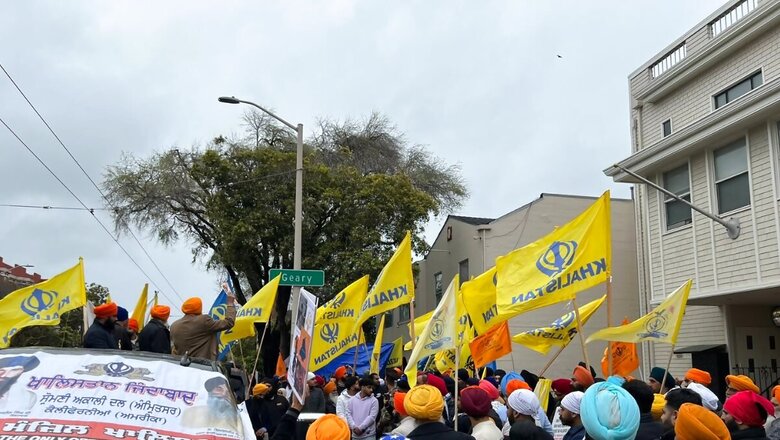
views
On Wednesday, India sent a strong message to the UK government as it reduced security outside the British high commission and the envoy’s residence: That there would be consequences if India’s interests were harmed in the West. The development came in the wake of a violent protest outside the Indian mission in London over the weekend.
The pulling down of the national flag atop the India High Commission in London by Khalistani separatists on Sunday may appear to be a desperate act of vandalism by a few miscreants. But the truth is this is more the case of the State not just refusing to act against a few thousand Khalistani thugs and their sympathisers, but also encouraging them to act the way they did in London this Sunday, hoping this may appease what has become a substantial vote-bank, especially for the Labour Party, but also somehow derail the India Story. Interestingly, the High Commission storming saga has come on the heels of the British government-funded BBC’s hitjob documentary that targeted Prime Minister Narendra Modi over the 2002 Gujarat riots despite the Supreme Court giving him a clean chit after a detailed investigation.
The UK in that way is not an exception. Almost all ‘First World’ nations with substantial stakes in democracy and the democratic way of life — from Canada and the United States to Germany and Australia — can be accused of looking the other way when such subversive elements work overtime on their soil to dismantle the world’s largest democracy. While the West in general has shown utter inaptitude, if not indifference, in containing anti-India forces on its soil, the British record has been the most pathetic and hypocritical of them all. There was, after all, no reason for the British authorities to be caught napping this Sunday when the Modi government had forewarned Whitehall and MI-5 about the planned Khalistani protests on Sunday. That this has happened under the watch of an Indian-origin Prime Minister in Britain makes the story even more interesting. For, it will as much hit the image of new India, which has just overtaken the British economy to become the world’s fifth largest economy, as it puts Prime Minister Rishi Sunak on a slippery slope, much to the delight of the British establishment, including the Deep State.
This was, however, not the first time that such anti-India forces were given free passes in the UK. In 2019, soon after the abrogation of Article 370, the Indian High Commission in London was attacked by a 10,000-strong mob of British Pakistanis. Then too, the politico-administrative will to deal with these arsonists was sorely missing. Three years later, during the 2022 Leicester violence, Hindus settled in the UK were again selectively targeted by Britain-based Islamists — and the police just refused to intervene.
Across the Western world, especially in the UK and Canada, Sikh groups are mostly controlled by Khalistani sympathisers who operate in tandem with Islamist outfits, pushed, promoted and patronised by the local Pakistani diplomatic mission under the aegis of the ISI. Any shortfall to fund Khalistani militancy abroad and in India is now being met by Pakistan’s ISI, while the West happily ensures they are provided safe refuge and passage.
But in Britain, things get even more complicated, given its inherent anti-India bias and, worse, pro-Pakistan tilt. Historically, when the Europeans first came to India, they were overwhelmed by the socio-cultural and economic superiority and sophistication of this country. In 1616, when Sir Thomas Roe arrived in Agra, India, as the first accredited English ambassador to the Mughal Empire, he was acutely aware of the shabbiness of the gifts he had brought from England. By the early 19th century, however, more so after the 1857 mutiny, Indians and their way of life began to be looked down upon. This derision for Indians took an intense Hindu hatred turn as the British saw the freedom struggle largely as a Hindu movement for independence under the Congress leadership.
The Congress leadership under Gandhi, Patel and Nehru was innately secular in nature, but the British and the Muslims saw them as Hindu leaders. In their eyes, the Congress was a Hindu party and the British thus could never forgive ‘Hindu India’. Also, the fact that the creation of Pakistan was almost entirely the product of British geopolitical strategy to keep a portion of the subcontinent, if it couldn’t keep the whole of it, so as to avert an expected Soviet threat to the region, made the UK establishment go traditionally soft on Pakistan. The British distrust for ‘Hindu India’ was further magnified after the Nehruvian dispensation pursued a largely anti-Western, pro-Soviet foreign policy in the name of non-alignment.
The British establishment, including its Deep State, still betrays that anti-India bias; in fact, it has only intensified in recent years, especially with Modi’s India being the only “bright spot” in the otherwise gloomy economic scenario, defying the Churchillian doomsday scenario. What further bothers the Western world is the conventional Indian tendency to go solo in geostrategic affairs, as in the case of Ukraine. It has also been a considered view of this writer that the West and India are at best “friends with benefits”, a term Seema Sirohi has used for her latest book, The India-US Story. And when a friendship is based on benefits, it tends to swing as issues change. Yes, the West wants India as a bulwark against China, but it is also a fact that the West is deeply wary of rising India. Especially the establishment and the Deep State in the West that are yet to accept India as an all-weather friend.
The London High Commission saga once again underlines the distrust that the British establishment betrays for India. It is this milieu that lets all sorts of anti-India elements find easy access to and safe refuge in the UK. Sadly, at a time when Prime Minister Modi is genuinely trying to bridge the gulf between India and Britain by pushing for a free trade agreement (FTA) with the UK, even when the latter is likely to experience greater windfall from the deal than India, the typical British distrust for him and his idea of India has only become stronger. From CAA and Article 370 revocation (when the UK government openly supported Pakistan on Kashmir) to Leicester, BBC and London High Commission storming, Britain has refused to reciprocate to India’s friendly policies and gestures. In fact, the hitjob against India and PM Modi has only increased, especially at a time when India has taken over the presidency of G20 and is also slowly gearing up for the national elections early next year.
Maybe Britain takes India’s friendly gestures as its weaknesses. The Modi government provides the British High Commission in India and its diplomats full security and protection. In the name of democracy and freedom of speech, if a few Khalistanis, who could have easily been disbursed with mere dandas, can storm India’s London High Commission, then what stops India from giving the same ‘democratic rights’ to a few thousand Argentinian protesters (on the issue of the Salinas Islands) and Scottish separatists in New Delhi? I am sure the free-spirited Englishmen and women who love wining and dining with Islamists and Khalistanis won’t mind this.
India’s decision to reduce security outside the British mission in Delhi should convey the message to the West that India’s patience is running thin. Anyway, friendship can’t be a one-way traffic.
The author is Opinion Editor, Firstpost and News18. He tweets from @Utpal_Kumar1. Views expressed are personal.
Read all the Latest Opinions here


















Comments
0 comment